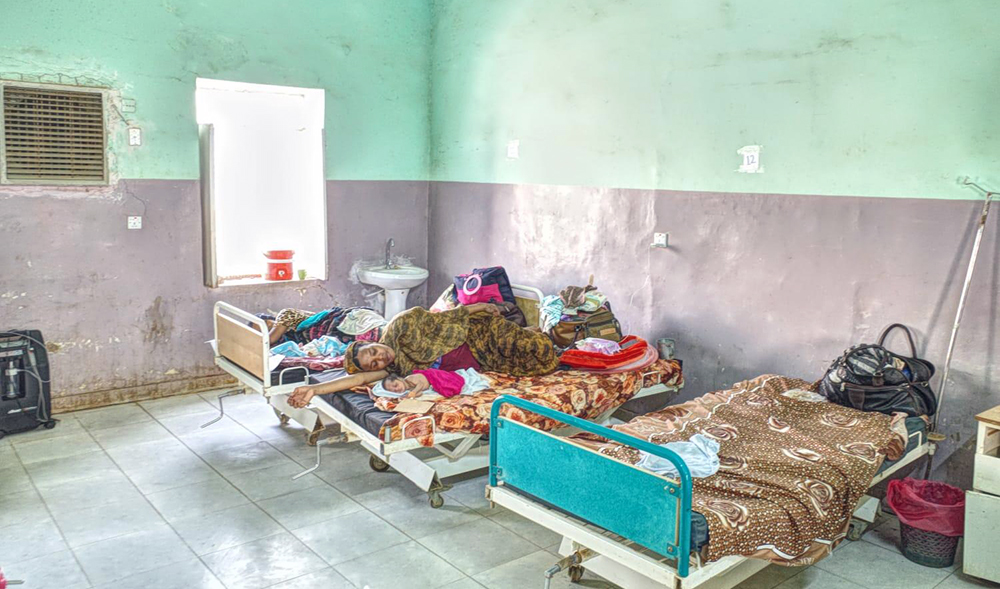
Voices from the Field: Meeting Countless Medical Needs Amid Conflict in Sudan
Dr. Mohammed Bashir, Deputy Medical Coordinator at Médecins Sans Frontières (Doctors Without Borders), speaks about his experience as a doctor in Sudan and saving lives in the midst of inadequate resources since the outbreak of conflict in his country.
"I never imagined, before April 15th of last year, that I would find myself in Khartoum, the capital of our country, and that I would be working in a conflict zone.
I am a doctor from Sudan and have been working with Médecins Sans Frontières for many years, but I have never witnessed the suffering that my fellow countrymen endure on a daily basis.
This conflict is catastrophic, with over 7 million people displaced today due to the violence, whether internally or externally, finding themselves almost destitute in makeshift camps.
Neither my family nor I have been spared from the conflict, like many others.
Collapsing Healthcare System
Sudan has long suffered from a fragile healthcare system, and this ongoing conflict has led to its collapse. For months, I have been supporting Médecins Sans Frontières teams in two hospitals in Khartoum state and another in the Am Rakoba camp in the east. When people think of medical needs during conflicts, images of individuals injured by bombs and bullets often come to mind.
But I have also witnessed a growing number of medical emergencies resulting from untreated complications of chronic diseases. There are people who managed diabetes and asthma for years and are now unable to secure the necessary medications to stay alive.
There are also enormous needs in maternal care, especially among pregnant women requiring cesarean sections or emergency deliveries. So, our team in Am Dweaban, one of the hospitals I covered, supported the maternity team, assisting in over 1,500 births since July.
However, maternal services across the country no longer function regularly, leaving pregnant women facing life-threatening complications without access to emergency obstetric care. When healthcare services are available, their quality is questionable.
The Importance of Vaccination and Nutritional Support
As a citizen and a doctor, I feel a deep concern when thinking about the increasing health needs in my homeland, some of which predate the conflict but have worsened because of it. Sudan has a troubling history of infectious diseases such as measles and meningitis. Vaccination can prevent these highly contagious diseases, but without vaccines, they can be deadly, especially among young children. Malnutrition also puts childrens lives at risk, weakening their immune systems.
In the face of a collapsing healthcare system and the escape of hundreds of thousands from violence, with most now residing in crowded makeshift camps, comprehensive vaccination programs and nutritional support are not just important but have become a lifeline to save their lives.
Working with Communities
Most of the areas where Médecins Sans Frontières operates in Sudan are active conflict zones, making our work extremely challenging and dangerous, but it also strengthens our determination.
This determination is not limited to Médecins Sans Frontières but includes communities collaborating to support each other. In the Am Rakoba camp in the east, for example, Médecins Sans Frontières teams provide essential medical care to thousands of people living in the camp and the surrounding areas.
It wasnt clear when the conflict broke out whether we could continue medical support there, but with the determination of the core team, there was no gap in service. Last year alone, we conducted about 40,000 medical consultations and assisted around 507 women in safely delivering their babies. Yet, in Am Rakoba, I saw firsthand the importance of the role played by volunteers and midwives from the local community.
However, determination alone is sometimes not enough. As a doctor, I took a sacred oath to do everything in my power for people in need of medical care. As the Deputy Medical Coordinator at Médecins Sans Frontières, my responsibilities go beyond treating patients. I must coordinate care on a wide scale, ensure teams and supplies are sent where needed most.
But how can I fulfill this commitment when resources and the hands providing assistance are hindered and face danger? This question echoes in my mind day and night.
It is a matter of life or death for all parties involved in this conflict to realize the sole purpose Médecins Sans Frontières seeks: securing medical care for the most vulnerable without expecting anything in return. Access to healthcare must be secured for the teams and vice versa. All must be protected today, not tomorrow. The lives we seek to save depend on it.
My work in my homeland Sudan is not just a job; it is part of my humanity. Ethical duty compels me, as well as my colleagues at Médecins Sans Frontières, to do everything in our power to alleviate suffering in the face of conflict.
I remain committed to this cause."
Source: Médecins Sans Frontières Sudan Website

